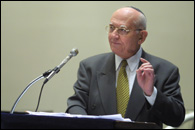|
|||||||||||||
 |
||||||||||||
October 10, 2002 - Volume 35 Number 03 |
||||||||||||
|
|
Ancient tradition, modern law
"Don't be afraid from all these papers," joked Menachem Elon as he sorted through an unwieldy anthology of his loose-leaf notes at the podium of the Faculty of Law's Maxwell Cohen Moot Court. The retired deputy chief justice of the Israel Supreme Court was at McGill October 3 to inaugurate the Gisia Kisilevsky Program in Jewish Law with a lecture entitled "Jewish and Democratic Values: Reaching a Synthesis." Elon's topic, like Jewish law itself, is no light affair. What followed was a whirlwind tour, expertly guided, from the Torah to the recently enacted Basic Laws of the State of Israel, following a path that never strays too far from its source. "The first thing to understand is that Jewish law has been active and developing for most of Jewish history," Elon said. "The second is that it is much more than religious law. Jewish law touches every area of human existence." The whole of Jewish law, or Halakha, is rooted in the Torah, which is conservatively defined as the first five books of the Bible. These fundamental laws are believed to define the correct way to live, according to God. But they have never been static. Elon explained that during the 2,000 years of the Diaspora, when Jews were dispersed throughout Europe, North Africa and the Middle East, Jewish law not only survived and developed, but also unified. Scattered Jewish settlements remained autonomous within their larger city-states. When a difficult legal question arose, it was directed to the day's foremost religious authorities. These rabbinical judges interpreted the Torah and precedent body of law to render a decision. A written collection of these court decisions, or Responsa, from the 8th to 18th centuries numbers more than 300,000. In this way, the law evolved alongside human intellect and wisdom. Elon likened the phenomenon to a great polyphonic symphony written long ago: "Every generation needs a great conductor to interpret it for a modern audience." With good reason. The writing of the Torah, and the codes that it spawned, preceded not only contemporary culture but also many contemporary concepts. There are no contracts, no public, no democracy. Over time the issues that rose again and again in the rabbinical courts of the Diaspora required deft interpretation. "The Responsa dealt with the same problems we face today in synthesizing Jewish and democratic values," Elon explained. "I say 'Ein hadash takhat hashemesh.' There's nothing new under the sun." Elon returned to ancient centuries to cite Responsa that ruled on central populist issues before democracy had a name: one proclaimed the right of majority rule essential to the existence of community itself; another granted protection of certain rights even to the minority. But the responsibility of judges grows no easier. The need for skilful interpretation is magnified in today's State of Israel, where a non-Jewish minority coexists with a Jewish majority, many of whom consider themselves to be secular, or non-religious. Still, Elon believes that Jewish Law is Jewish heritage, each irrevocably entwined in the other. The landmark 1992 Basic Law: Human Dignity and Freedom, one of a series of Basic Laws enacted over the past 30 years in lieu of a constitution, obliges Israeli judges with constitutional questions to anchor their decisions in "the values of the State of Israel as a Jewish and democratic State." "Pay attention," Elon said. "First Jewish, and then democratic." To demonstrate an occasion on which Jewish law was ruled to outweigh what are commonly considered democratic values, Elon cited a case from the century just past. After serving his term in prison, a Lebanese man associated with the Islamic group Hamas was denied his right to freedom until a Jewish captive was returned. "Leviticus says 'Do not stand idly by the blood of your fellow.' There is no commandment greater than the redemption of captives," Elon said. "Here, Jewish overrides democracy." The synthesis of Jewish and democratic values will be debated well into the new millennium, Elon added, and so the continuing study of Jewish law is vital. He was delighted to find that the Gisia Kisilevsky Program in Jewish Law would offer courses to students from the Faculties of Law and Arts at McGill. "I have been honoured to establish programs and chairs in Jewish law at many other prestigious universities," he said. "Other programs reside in a single faculty. The cooperation of the Faculties of Arts and Law is an important and welcome innovation. "Within Jewish heritage, there are many different views and opinions which have contributed to the depth and richness of Jewish law through all the generations. Such an approach is essential to Jewish thought." The Gisia Kisilevsky Program in Jewish Law was created through a gift from Marlene and Joel King in memory and honour of Joel's grandmother, a Russian émigré who raised him and his brothers after their mother died. The program began this fall and is administered by the Department of Jewish Studies. Future plans include a minor in Jewish Law and the hiring of a visiting professor. |
|
||||||||||
|
McGill Reporter
Burnside Hall, Room 110 805 Sherbrooke Street West Montreal, Quebec H3A 2K6 Phone: 514-398-6753 Fax: 514-398-7364 Unit detail |
Copyright 2003
McGill University Last modified 2002-11-07 |
|||||||||||
The
McGill Reporter is McGill University's award-winning faculty/staff newspaper.
Published by the University Relations Office, the Reporter publishes bi-weekly
during the academic year and is available throughout McGill's downtown and
Macdonald campuses. For more information: 398-6753. |
||||||||||||
